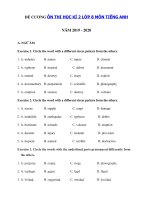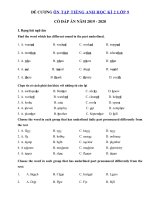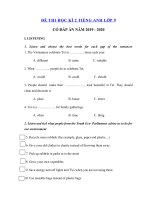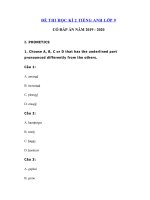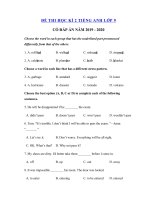de cuong mon anh lop 9 hoc ki 2
Bạn đang xem bản rút gọn của tài liệu. Xem và tải ngay bản đầy đủ của tài liệu tại đây (104.13 KB, 5 trang )
<span class='text_page_counter'>(1)</span><div class='page_container' data-page=1>
<b>Đề cơng ôn tập môn tiếng anh 9</b>
<b>Năm học: 2011- 2012</b>
<b> By: Nguyen Anh Son</b>
<b> Grammar:</b>
<b>1. Passive: (Câu bị động)</b>
a. Thì hiện tại đơn:
*Active (chủ động) : S + V(s, es) ...+ O
* Passive (bị động) : S + BE (am/is/are) + Vp2....( BY+O)
*Question: Be + S + Vp2...(+ By + O) ?
b. Thì hiện tại tiếp diễn
*Active (chủ động) : S + Be (am/ is/ are) +Ving ...+ O
* Passive (bị động) : S + BE (am/is/are) + Being +Vp2....( BY+O)
*Question: Be + S +Being + Vp2...(+ By + O) ?
c. Th× hiện tại hoàn thành :
*Active (chủ động) : S + Have/ has +Vp2 ...+ O
* Passive (bị động) : S + Have/ has + Been +Vp2 ...(By+ O)
*Question: Have/ has + S + Been + Vp2...(+ By+O) ?
d. Thì quá khứ đơn :
*Active (chủ động) : S + V(ed, cột 2) ...+ O
* Passive (bị động) : S + Was/ were + Vp2....( BY+O)
*Question: Was/were + S + Vp2...(+ By + O) ?
e. Th× qóa khø tiÕp diƠn:
*Active (chủ động) : S + Was/ were +V_ing ...+ O
* Passive (bị động) : S + Was/ were + Being +Vp2....(+ By+O)
*Question: Was/were + S +Being + Vp2...(+ By + O) ?
f. Thì quá khứ hoàn thành:
*Active (ch ng) : S + Had +Vp2 ...+ O
* Passive (bị động) : S + Had + Been +Vp2 ...(By+ O)
*Question: Had + S + Been + Vp2...(+ By+O) ?
g. Thì tơng lai đơn:
*Active (chủ động) : S +Will +V_infinitive ...+ O
* Passive (bị động) : S + Will + Be (không chia) +Vp2 ...(By+ O)
*Question: Will + S + Be(không chia) + Vp2...(+ By+O) ?
h. Thì tơng lai tiếp diễn:
*Active (ch ng) : S +Will +Be +V_ing ...+ O
* Passive (bị động) : S + Will + Be (không chia) +Being+Vp2 ...(By+ O)
*Question: Will + S + Be(không chia) +Being + Vp2...(+ By+O) ?
i. Thì tơng lai hoàn thành:
*Active (ch ng) : S +Will have +Vp2 ...+ O
* Passive (bị động) : S + Will have + Been +Vp2 ...(By+ O)
*Question: Will + S +have + Been + Vp2...(+ By+O) ?
** Modal verbs (động từ khuyết thiếu)
*Active (chủ động) S + (modal verbs)+ V_infinitive + O...
* Passive (bị động) S + (modal verbs)+ be + V-ed/ V3(past participle) ...(+By+O)
<b>2. Wish:(câu điều ớc khơng có thật ở hiện tại)</b>
<b>*Cấu trúc: S1 + Wish(es) + S2 + -Would/ could + V_infinitive....</b>
<b> -V (simple past_quá khứ đơn)</b>
<b> -Were...</b>
<b>** Lu ý: + Nếu động từ theo sau S2 là (to)be thì thờng chia là </b>
<b>“</b>
<b>WERE</b>
<b>”</b>
<b> với tất cả các chủ</b>
<b>ngữ (xem công thức)</b>
<b> + S1 và S2 có thể giống nhau hoặc khơng (tuỳ theo nghĩa của câu)</b>
<b>3. Adverb clauses of result:(mệnh đề trạng ngữ chỉ kết quả)</b>
so /therefore : vì thế/ vì vậy / do đó...
Ex: Ba stayed up late so he is tired.
Ba stayed up late therefore, he is tired.
<b>4. Adverb clauses of reason: :(mệnh đề trang ngữ chỉ nguyên nhân)</b>
as/ because/ since: vì/ bởi vì
Ex: Ba is tired because/ as/ since he stayed up late.
<b>5. Making suggestions: (câu gợi ý, đề nghị )</b>
* S + suggest(s) + V-ing + ...
* S + suggest(s) + (that) + S (+ should )+ V(infinitive) +...
EX: He suggests going fishing this weekend
</div>
<span class='text_page_counter'>(2)</span><div class='page_container' data-page=2>
<b>6. Adverbs clauses of concession: although/ though/ even though : mặc dù </b>
Ex: He went to school although/ though/ even though he was tired.
<b>7. Relative clauses: (Mệnh đề quan hệ) </b>
<b> - Who:</b>
thay thế cho danh từ chỉ ngời (subject_làm chủ ngữ trong c©u)
<b> - Whom: thay thế cho danh từ chỉ ngời (object_làm tân ngữ trong c©u) </b>
<b> - Which: thay thế cho danh từ chỉ vật (S/O_ có thể là chủ ngữ hoặc tân ngữ trong câu)</b>
- That:
thay thế cho danh từ chỉ ngời/ vật. (không dùng trong mệnh đề không xác
nh_cú 2 du phy)
<b>8. Conditional sentences:</b>
(Câu điều kiện)
* Conditional type 1(câu điều kiện loại 1):
* Công thức: If + S + V(s, es) / Be( am/is/are)... , S + Will + V_infinitive...
* Cách sử dụng: Dùng để diễn tả:
+ Điều phỏng đoán có thể xảy ra trong tơng lai ( VD1)
+ Điều chắc chắn sẽ xảy ra (VD2)
Ex: 1. If it is fine tomorrow, I will go fishing
2. If you let an object off your hand, It will fall
* Conditional type 2(câu điều kiện loại 2):
* C«ng thøc : If + S + -V (simple past) ... , S + Would/ could + V_infinitive
- Were...
- Could + V_infinitive...
* Cách sử dụng : Chúng ta dùng câu điều kiện loại 2 để diễn tả 1 điều khơng có thật ở hiện
tại và cịn đợc gọi là câu điều kiện khơng có thật ở hiện tại.
Ex: Nam could arrive at school on time if he had an alarm clock.
<b>ĐỀ I</b>
<i><b>I. Circle the correct answer to complete the sentences.</b></i>
1. We pay the ________bill at the end of each month.
A. electricity
B. electric
C. electrical
D. electrician
2. Mary felt asleep during the play ________she was tired.
A. if
B. because
C. while
D. but
3. She said that she ________you some day.
A. had visited
B. visited
C. would visit D. visits
4. You have lived here since 1999, ________you?
A. didn’t
B. haven’t
C. don’t
D. have
5. Mr. &Mrs. Smith have celebrated their golden wedding anniversary________.
A. last
B. late
C. later
D. lately
6. Liz talked ________about her job.
A. interest
B. interesting C. interested D. interestingly
7. Mr. Brown suggests ________showers instead of baths.
A. take
B. taking
C. to take
D. should take
8. If we use much pesticide on vegetables, they ________poisonous and inedible.
A. will become
B. shall become
C. will becomes
D. would become
<i><b>II. Rewrite these sentences using the words in brackets.</b></i>
1. He won’t go for a picnic with my family next Saturday.
- I wish
2.
“
You must wear uniforms tomorrow.
”
our form teacher said to us.
- Our form teacher said
3.
“
What subject do you find the most difficult?
”
Miss Lan asked.
</div>
<span class='text_page_counter'>(3)</span><div class='page_container' data-page=3>
- Mr. Baker asked
5.
“
Open the window, please
”
my teacher asked us.
- My teacher asked us
<i><b>III. Put the correct form of the verbs in brackets.</b></i>
1. Don’t worry, if you (revise)______your lesson thoroughly you (can)______get good grades.
2. Listening (find)_______the most difficult aspect of (learn)_______English.
3. At last you are here! I (wait)_______you for more than half an hour.
4. When (be)_______the last time you (write)_______to Jim?
5. You (hear)_______anything from James?
~ No, we (not keep)_______in touch since he (move)_______to London.
IV. Complete each sentence with the correct form of a suitable phrasal verb given.
go off take off
look up see off
1. My parents _______me _______at the railway station.
2. I got up late in the morning because my alarm clock did not_______.
3. What is Nam doing? He _______a new word _______in the dictionary.
4. Remember to _______your shoes when you go into the temple.
<b>ĐỀ II</b>
<i><b>1. Circle the correct answer to complete the sentences.</b></i>
1. Tam is not _____with her preparations for her mother’s birthday party.
A. satisfy
B. satisfying
C. satisfied
D. satisfaction
2. My friend John, _____car was stolen has decided to buy a new one.
A. who
B. whose
C. which
D. that
3. Carol is from London, _______is on the Thames.
A. that
B. where
C. who
D. which
4. We will wait for her until she _______her report.
A. finish
B. will finish C. is finishing D. finishes
5. Tomorrow Hanoi’s temperatures will be_______19
0<sub>C and 26</sub>
0<sub>C. </sub>
A. between
B. among
C. about
D. at
6. If it rains tomorrow morning, my mother _______in the field.
A. doesn’t works B. won’t work C. didn’t work
D. wouldn’t work
7. My brother suggested _____a tired and a stripped T-shirt for my father on his 45th birthday.
A. to buy
B. buy
C. buying
D. bought
8. When the tidal waves occurred, a lot of people _______in the sea.
A. was swimming B. swam
C. are swimming
D. were swimming
2. Read the passage and choose the most suitable word to fill in each gap.
like
plane
it
them
enoughso
other
</div>
<span class='text_page_counter'>(4)</span><div class='page_container' data-page=4>
When you are (1)_______holiday and intend to go to the seaside or travel abroad (2)_______a tourist,
you should first of all decide on the means of traveling. You can travel by train, by ship, by car and of course
by (3)_______.
Traveling by plane (4)_______more comfortable, more convenient and much quicker than any
(5)_______. But not everybody likes (6)_______. Some people say they do not see very much (7)_______the
country they go to. Trains are good (8)_______for them. They enjoy the movement and the excitement of
railway stations, the shouts of posters pulling and pushing luggage along the platforms, and the sight of train
ready to start.
<i><b>3. Read a text about Galileo and decide if the statements are true or false.</b></i>
Galileo was one of the first modern scientists. He was born in Pisa, Italy, in 1564. He studied
philosophy, mathematics and astronomy. He was interested in the way the Earth and other planets move round
the sun. He was famous for his study of how things fall. Before people used to think that heavy things always
fell faster than light things. He did experiments about this problem and discovered that both heavy things and
light things fell at the same speed. Many religious people did not agree with him because his scientific ideas
were different from theirs. He even went to prison for a while, but no one could stop him from thinking. He
continued to look for scientific answers.
<i><b>Statements</b></i>
1._____Galileo was a modern scientist.
2._____He was born in 1646.
3._____He studied chemistry.
4._____He studied mathematics, too.
5._____He was famous for everything.
6._____He discovered that both heavy things and light things fell at the same speed.
7._____Many religious people disagreed with him.
8._____He kept on looking for scientific answers even though he was sent to prison for
a while.
<i><b>Answer Key </b></i>
<i><b>ĐỀ I</b></i>
I.
1. electricity
2. because
3. would visit
4. haven’t
5. lately
6. interestingly
7. taking
8. will become
II. 1. I wish he could go for a picnic with my family next Saturday.
2. Our form teacher said we had to wear uniforms the next/following day.
3. Miss Lan asked me what subject I found the most difficult.
4. Mr. Baker asked me if/ whether I spoke any other languages.
5. My teacher asked us to open the window.
III. 1. revise-can
2. is found- learning 3. have been waiting/ have waited
4. was- wrote 5. Have you heard-haven’t kept-moved.
</div>
<span class='text_page_counter'>(5)</span><div class='page_container' data-page=5>
<i><b>Answer Key </b></i>
<i><b>ĐỀ II</b></i>
1.
1. c. satisfied
2. b. whose
3. which
4. finishes
5. between
6. b. won’t work
7. c. buying
8. d. were swimming
2.
1. on
2. as
3. plane
4. is
5.other
6. it
7. of
8. enough
</div>
<!--links-->


